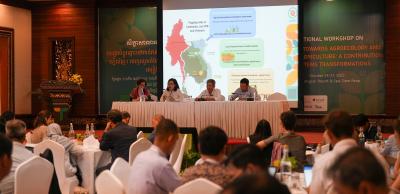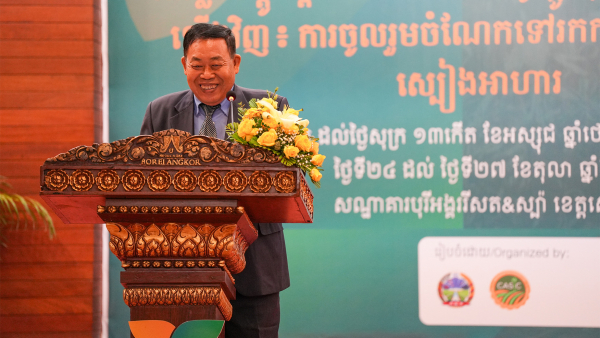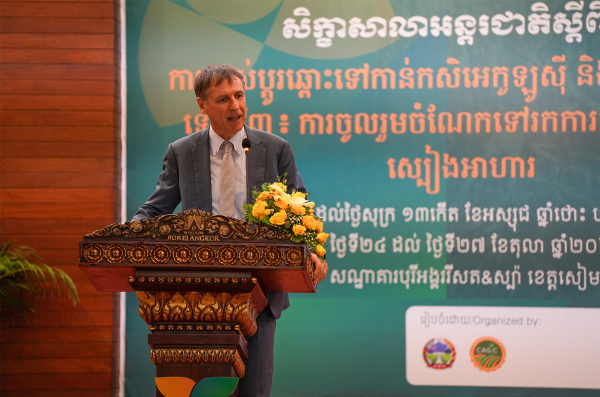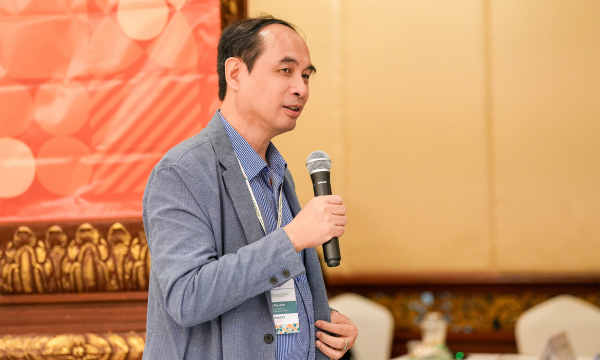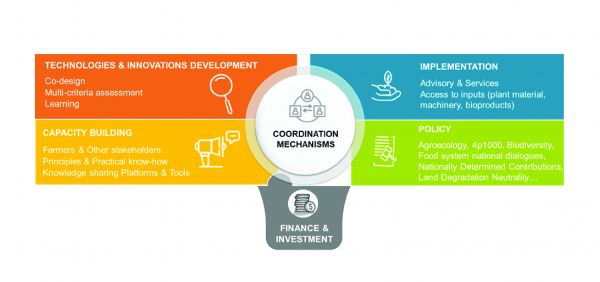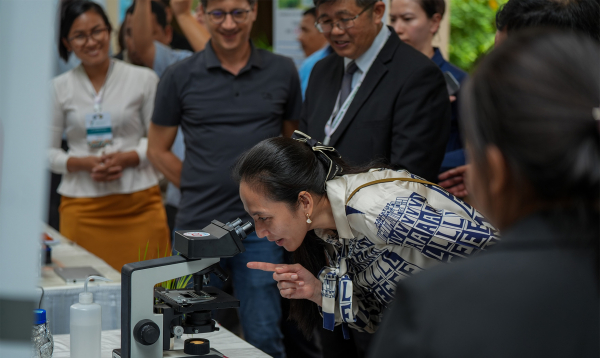- Home
- Worldwide
- Our regional offices
- Continental Southeast Asia
- News : Continental Southeast Asia
- Siem Reap Hosts TARASA23
Siem Reap Hosts the Transitioning Towards Agroecology and Regenerative Agriculture 2023 (TARASA) conference
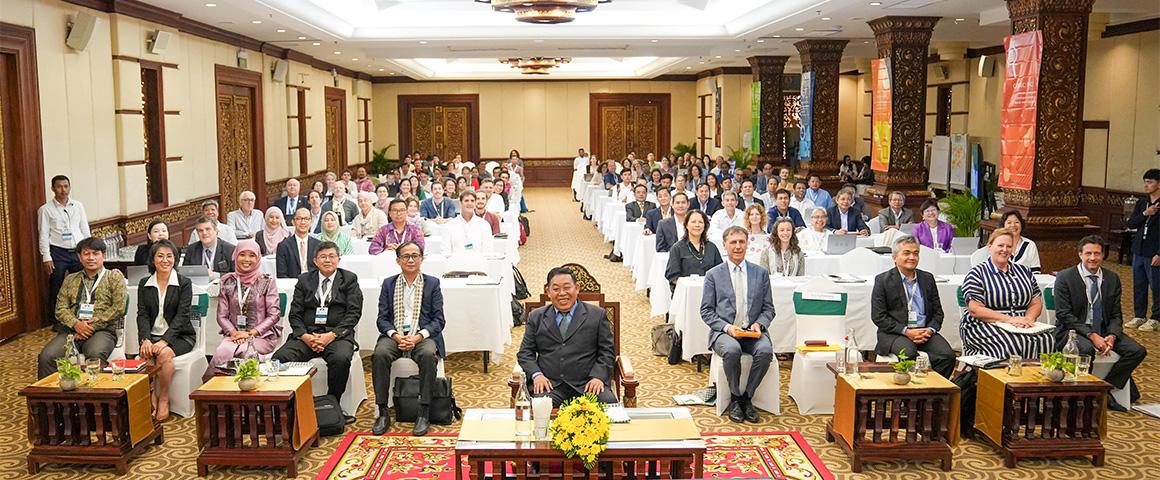
Participants from 21 countries gathered in Siem Reap for the TARASA23 conference, organized by MAFF and CASIC, opened by HE Om Kimsir, Secretary of State of the MAFF and chair of CASIC’s Steering Committee © Vearyda Oeu, 2023
In Siem Reap, Cambodia, the Transitioning Towards Agroecology and Regenerative Agriculture: A Contribution to Food Systems Transformations, for Agroecological Transition 2023 (TARASA23) conference (visit website), held from October 25-27, assembled a diverse group of 200 stakeholders from 21 countries and 95 institutions to engage in a three-day forum on the agroecological and regenerative transformation of food systems in the ASEAN region.
Organized by the Ministry of Agriculture, Forestry and Fisheries (MAFF) through the Cambodia Conservation Agriculture and Sustainable Intensification Consortium (CASIC) , with the support of co-organizers including CIRAD, The Food and Agriculture Organization (FAO), the United Nations Economic and Social Commission for Asia and the Pacific (UN-ESCAP), The Agroecology and Safe Food System Transitions (ASSET), Innovation for Sustainable Agriculture (ISA) project, Swisscontact, organized in collaboration with the 4 per 1000 initiative, Agroecology Coalition, and Operationalizing the International Research Consortium on Soil Carbon (ORCaSa). TARASA was made possible with the sponsorship from the French Development Agency (AFD), The French Facility for Global Environment (FFEM), the European Commission, French National Research Institute for Sustainable Development (IRD), The Deutsche Gesellschaft für Internationale Zusammenarbeit GmbH (GIZ), and the Swiss Agency for Development and Cooperation (SDC). The event was supported by Eurocham Cambodia, World Overview of Conservation Approaches and Technologies (WOCAT), and Agroecology in Southeast Asia (ASEA).
The pre-event, hosted by FAO, focuses on establishing a unified approach for agroecological transitions within ASEAN. The dialogue involved over a hundred participants from ASEAN countries and the EU. The output anticipates refined guidelines through national and regional consultations, with a strategic review scheduled for late 2023.
TARASA23: Uniting Global Experts for Agroecological Advancement in ASEAN
On October 25 morning, His Excellency Om Kimsir, Secretary of State of the MAFF and chair of CASIC’s Steering Committee, officially opened the conference. He was joined by guests of honors His Excellency Jacques Pellet, Ambassador of France to Cambodia, Dr. Dian Sukmajaya, representative of ASEAN Secretariat, Mr. Markus Buerli, Director of Cooperation of the Swiss Agency for Development and Cooperation (SDC), and Ms. Rebekah Bell, Representative of FAO in Cambodia, and Mr. Oliver de Oliveiros Coordinator of the Agroecology Coalition.
The transition to agroecology and regenerative agriculture requires a paradigm shift in our thinking, a departure from conventional approaches that prioritize short term gains over long term sustainability.
This is a time to harness collective expertise at a territorial scale to address the pressing development issues faced by the country.
Over the next three days, participants shared their experiences through a series of 33 presentations and experiences collected across ten different countries. The diverse range of voices set the stage for a more extensive discussion on agroecology and regenerative agriculture's role in supporting sustainable farming and the transformation of food systems.
The Asian region is under high pressure of food security on the land with some countries reaching the ceiling of productivity. The transition to agroecology is a way to resolve this environmental challenge.
The 'Bulb Approach' to Agroecology and Food Systems
The agenda was designed following CASIC’s “bulb approach,” highlighting the need for a shift across multiple systems with a comprehensive agenda pinpointing crucial research and intervention areas within technology, education, policy, and finance sub-systems to support this transition. This approach provided an opportunity to reflect on lessons learned, aiming to scale successful practices and analyze past shortcomings.
The Innovation Fair: a dynamic shift towards sustainable practices at the grassroots level
The TARASA conference was marked with inclusive participation from farmer associations like the Asian Farmers Association (AFA) , civil societies, and youth-led projects such as "1 Million Voices'. Alongside scheduled discussions, 20 institutions displayed their work at the agricultural Innovation Fair. The fair was honored with the presence of the First Lady, Lok Chumteav Pich Chanmony Hun Manet.
CIRAD, as a co-organizer, is proud to have played a role in the event's success with knowledge-sharing sessions, such as Vira Leng's analysis on the impact of long-term tillage on soil health in Cambodia's uplands (Department of Agricultural Land Resources Management (DALRM)/General Directorate of Agriculture) and Mathilde Sester's insights into agroecological crop protection for rice cultivation (CIRAD). Additionally, CIRAD was actively engaged at the Innovation Fair with Dei Meas, a transitional system advocating for a shift towards agroecological practices (DALRM, Swisscontact, SmartAgro, and CIRAD).
The closing ceremony establishes a new vision for the future: to establish TARASA as an annual, regionally-rotating event, in step with the ASEAN presidency, a testament to the event’s success and impact. This plan promises to enhance ownership and visibility, deepen ASEAN linkages, and leverage collective expertise to foster a sustainable agricultural future in Asia-Pacific.
























